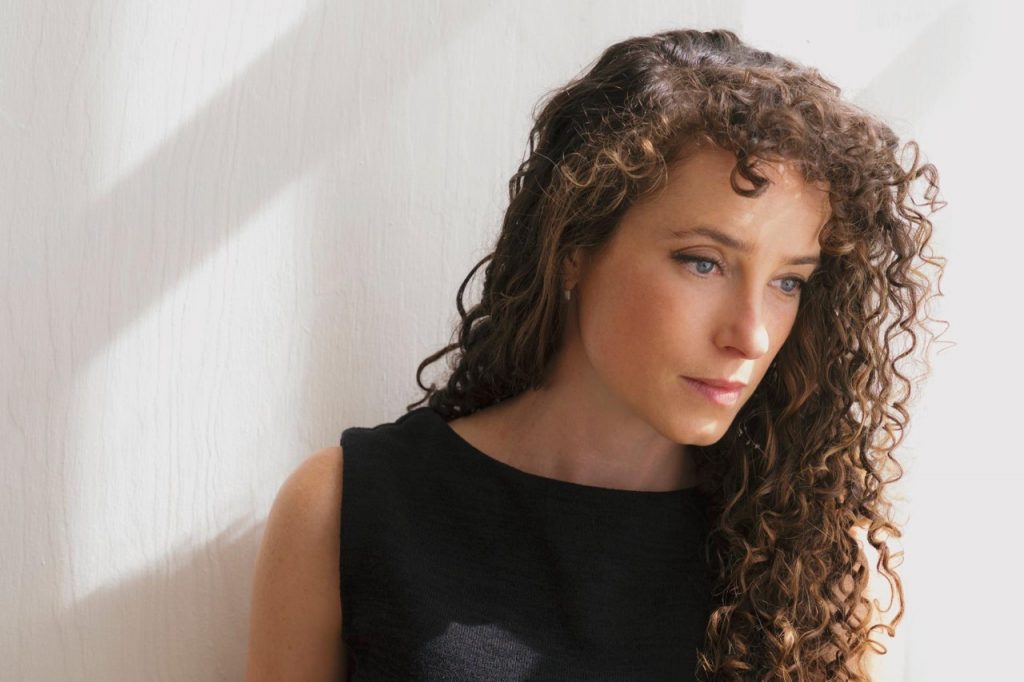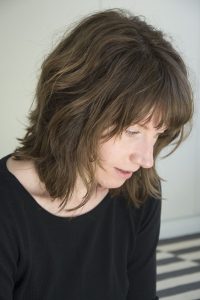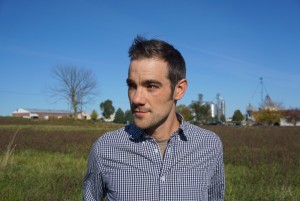
Luke Brekke, who serves on our Editorial Panel for poetry, shares a conversation with Rose McLarney about the musicality in her poem “Nutmeg and Mace,” featured in NER 40.1, and about her forthcoming collection Forage.
Luke Brekke: The music in the first two lines of your poem immediately grabbed my attention. “Spices were currency once. / Rent paid in peppercorns.” The poem goes on to grapple with a layered emotional terrain, yet sonic texture and music play a role throughout. Can you speak a bit about the role sound plays for you as a poet?
Rose McLarney: Sound often drives the formation of my poems. As I write, I may move between words by following sounds rather than reason, choosing, for instance, what word will come after another because of alliteration. I’d like to say it works like a hungry bat’s echolocation, the brain sending out a call for what it does not contain and listening until the signal bounces back, off a piece of language that will lead the way to a poem’s next phrase. But the yield isn’t so practical as prey. Instead, orienting by sound makes it possible to write a poem instead of the argument or straightforward observation the idea or images I started out with might otherwise have been. Musicality is what frees me from my overbearing practicality, to compose with pleasure and beauty as priorities.
I am drawn to internal rhyme, slant rhyme, consonance, alliteration, and refrains, and I listen for lines that feel too long or fall short according to each poem’s own aesthetics, though I rarely write in traditional forms. There is, of course, the risk of overdoing repeated sounds. And, so, when I am asking myself which repetitions are desirable and which are not, I suppose I trust a sort of natural sensibility. Everyone likes to hear waves crashing in and pulling out and crashing again, but not electronics beeping over and over. Maybe that’s because the former has a call and response quality and the latter is more incessant. In any case, I want the reader of my poem to wish for the sounds, like a cat’s purr, after each pause in it, to recur, not to react to them like the sounds of either a human snoring, or tapping her fingers with excess energy. I listen to drafts of poems for the perhaps inexplicable but somehow right qualities.
As for “Nutmeg and Mace,” sixty-some drafts ago, the second sentence was “In the middle ages, / you might pay your rent in peppercorns.” The phrasing is inelegant, but it’s surprisingly close (for me, a drastic reviser) to the final version. I am sure I cut the sentence down to the fragment “Rent paid in peppercorns” to highlight the consonance. In so doing, I made the short, sure-sounding lines from which the dynamic of the rest of the poem followed: the stating of known facts offset by a questioning voice that remains—and wavers—with its doubts.
LB: Can you share a little bit about how “Nutmeg and Mace” came about? The poem does such a graceful job of articulating the tensions between having a sensual appetite for the world and an understanding that our relationship to that world is finite. I’m curious how the subject of the spice trade came to be in the same poem with these other, more personal elements.
RM: My kitchen cupboard is so full of spices that there is barely room for the more substantial foods they’re to be applied to, and, after I cook, the plates and much more—fingers, tongues—are, as the poem says, ambered with curries or other seasonings. Around the time I wrote “Nutmeg and Mace,” I was also accruing quite a collection of information about spices by reading about the plants they come from, uses and trade, many angles. I wanted to use this information and understood that I needed a personal element or additional level to give the subject emotional interest for others, and myself authority to write about it. I love spices and so I overdo them because I can always acquire more, but, of course, we cannot replace so many other loves. When this thought, though not special in itself, occurred to me, the poem began to build around it.
Wanting to “use” material can be a questionable (if common) impulse for a writer. And I have often been frustrated that it seems poems cannot be about just one thing and that thing in itself, such as an animal that does not get made into a metaphor for some human condition. So “Nutmeg and Mace” critiques the inclination to make one subject bear the weight of another, particularly in the line, “Two spices, one tree: an analogy.” (The rhyme of this line intentionally verges on annoying.) At the same time, this poem can’t resist the appeal of finding likenesses either, and continues its couplings as it tries to reach understandings, and the speaker tries to feel less lonely in this life.
Also, for all my affection for foreign flavors and new information found through research, as I thought about spices, one of my strongest associations was the less than gourmet cinnamon toast my mother did make for me as a child—slices of store-brand bread that came out of the oven boiling up bubbles of cinnamon, brown sugar, and margarine, thanks to her generous application.
LB: Your next book, Forage, will be coming out later this year. I’m always eager to hear how a poet views a new collection in relation to the work they’ve done in the past. Can you say a little bit about this collection? Do the poems feel like an extension or deepening of work you’ve been exploring for a while, or more like a departure? Something else perhaps?
RM: I’ve been describing Forage as comprised of intricately sequenced poems on themes including animals’ symbolic roles in art and as indicators of ecological change and how water can represent a large, troubled system or the exceptions of smaller, purer tributaries. At the confluence of these poems is a social commentary that goes beyond lamenting environmental degradation and disaster to record—and augment—the beauty of the world in which we live. Forage, like my previous work, does deal with history, place, and the environment. But it’s less about the particular home environment in which I grew up—in the southern Appalachian mountains—and losing it (by leaving to find work and to cultural change), and functions more broadly as ecopoetry. It also reckons more fully with Southern heritage. In my life insulated in the coves of the mountain South, before moving to Alabama where I live now, the land of cotton and its exploitation, I was not aware enough of what it means be “Southern.”
Forage is the book that I am proudest of so far, and the one I have invested the most effort and thought in. This is not to say the others weren’t carefully wrought, but Forage is my most intellectual undertaking. In addition, Forage’s five sequences of eight poems each, which I intend to provide openings and closings as well as connections and counterpoints across the collection, required the most meticulous organizing, writing, reconceiving, and rewriting in relation to each other I’ve ever done. I’ve always given a great deal of attention to the arc poems in a book make when taken together, and I hope the poems in Forage speak to each other—and the reader—in an even more thought-provoking manner.
I should note that “Nutmeg and Mace” will actually be in my fourth collection of poetry, someday. I’m trying to write that collection as slowly as possible and distracting myself with side projects such as collaborations with visual artists, lyric essays, and editing until Forage has time to do what it will in the world. Right now, I suspect that the fourth collection will connect to, or react to, Forage’s poems that consider extinctions and the end of the Anthropocene with more personal poems that resist the idea of the elegy. I am writing poems like “Nutmeg and Mace” that are tributes to my mother that I want to try to articulate before she has passed beyond where she can hear them.
LB: Were there poets who were particularly helpful to you during the writing of Forage? Poets whose work you came back to as guideposts, perhaps, or others who pushed you into new directions? And who are you reading now?
RM: Ellen Bryant Voigt’s language, with its balance of elegance and economy, is a long-standing guidepost and, in her latest book, Headwaters, with its strikingly different style, she provides an inspiring model of ongoing innovation. I read Marianne Boruch when I feel my voice is getting stodgy and poems are getting stuck in restrictive conventions (that I invent and have imposed on myself). I read Larry Levis when I feel my writing is neither leaping far nor pulling in enough, or Brigit Pegeen Kelly. Gwendolyn Brooks’s poems are great for tuning the ear to music.
While writing Forage, I kept in mind the poems of Vievee Francis and Jennifer Chang as exemplars of how to write about landscape and the South. I read Jennifer Grotz’s books when writing about “issues” was causing me to lose control of the tone of the poem and sight of the grace I strive for.
At the moment, the books in the stack on my desk relate to ekphrasis. I’ve got Elizabeth Bishop, Rita Dove, Sylvia Plath, Rick Barot, Mark Doty, Mary Syzbist, Derrick Austin, Chelsea Rathburn, and Richard Siken to learn from, to name a few. Also, I have to say that I have volume 40.1 of NER on my desk, not because I am vain, but because, in addition to admiring the selection of poems, I want to revisit Molly Bashaw’s “All the Things We Once Thought Ordinary,” an essay that surpasses anything I’ve written in its expression of love for a mother and is transcendent in its lyricism.
♦
Rose McLarney’s collections of poems are Its Day Being Gone, winner of the 2014 National Poetry Series, and Forage, forthcoming in 2019, both from Penguin Books, as well as The Always Broken Plates of Mountains, published by Four Way Books in 2012. A Literary Field Guide to Southern Appalachia, which she coedited, is forthcoming from University of Georgia Press. Rose is Associate Professor of Creative Writing at Auburn University and coeditor-in-chief of the Southern Humanities Review.
Luke Brekke’s first published poem appeared in the pages of New England Review, and other writings have since shown up in Poetry Northwest, Missouri Review, Denver Quarterly and elsewhere. He’s a graduate of the Warren Wilson Program for Writers and has taught poetry in elementary, middle and high school classrooms. He lives in Wisconsin with his wife and two daughters.

